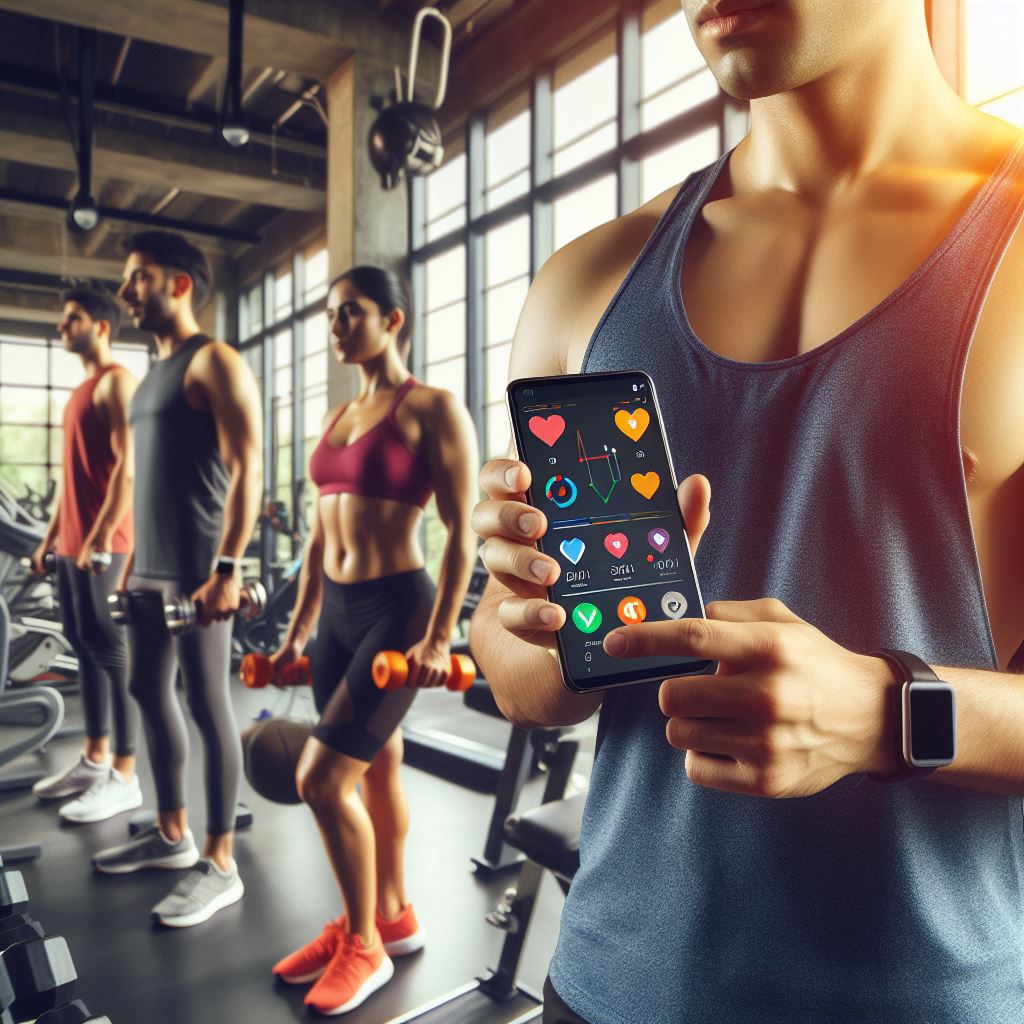In a world where the buzz of city life blends with the aspiration for a healthier lifestyle, Indian urbanites are embracing technology in their quest for quick and effective weight loss.
Juggling packed schedules and fast-food temptations, residents of bustling metropolises seek smart and streamlined means to shed those extra pounds. Amidst this scenario, one intriguing fact stands out: the fitness industry in India is rapidly evolving due to innovative tech solutions.
This blog dives into the digital revolution sweeping through India’s fitness landscapes and its profound impact on rapid slimming endeavors. From wearable gadgets that monitor every heartbeat to tailored online nutrition programs, we’ll explore how tech tools are reshaping waistlines across Indian cities.
Keep reading as we unfold ways that technology can be your ally in achieving weight loss goals — it just might surprise you what’s possible!
Key Takeaways
- Technology is helping people in Indian cities lose weight quickly. Wearable devices like fitness trackers, smart scales, and mobile apps let you check your progress at any time.
- Coaches and classes are just a click away on smartphones. This makes it easy to get advice and support for getting fit.
- New tech tools like Allurion offer ways to slim down without surgery. They have come to India to help many people who want to lose weight.
- Mobile devices prove useful for controlling weight. They give personal tips on what to eat and how much to exercise, fitting each person’s needs.
- Staying safe online is important when using these tools. Protecting personal health info must be part of using technology for weight loss.
Understanding Weight Loss: Factors and Methods

Losing weight happens for many reasons. People might want to look better or stay healthy. Sometimes a doctor says it’s important. Weight goes down when we use more energy than we eat from food.
Some find this easy, but others need help.
There are ways to shed pounds safely and effectively. Eating less junk food can make a big difference. Adding fruits, veggies, and whole grains is smart too. Exercise helps burn calories and builds muscle which also helps lose weight over time.
For some folks, surgery might be the answer if other methods haven’t worked.
Tech tools like apps on phones offer new ways to track eating and activity levels day by day – they keep you focused on goals! Connecting with online groups provides support from people who are going through the same struggle as you.
Remember, it’s not just about dropping sizes quickly; it’s about finding a balance that works long-term for your body and life!
The Role of Technology in Promoting Healthy Weight Loss

Technology plays a crucial role in promoting healthy weight loss by providing fitness assessment tools, access to coaches and classes, fitness trackers and wearable devices, smart scales, and notifications and reminders.
These technological advancements have revolutionized the fitness industry and have had a significant impact on promoting healthier lifestyles in Indian cities.
Fitness assessment tools
Fitness assessment tools are stepping into the spotlight. They show us how fit we are right now. These tools include things like tests to see how long you can run or apps that measure your strength.
With these, you get a clear picture of where you stand.
Access to this kind of information is changing lives in Indian cities. People use their phones or computers to check their fitness levels. This helps them set smart exercise goals.
It’s easier to track progress and stay motivated when you know what works best for your body.
Next up, let’s dive into how technology gives people more ways to connect with fitness pros and find workout buddies online!
Access to coaches, classes, and communities
Technology opens doors to new ways of slimming down in Indian cities. People can now tap into a world of health coaches, workout classes, and fitness groups with just a few clicks on their smartphones.
Human coaches are there to give advice and cheer you on. Some programs even use AI coaches that get better as they learn from each person.
Classes for yoga, dance, or strength training are easy to find online. These classes let you exercise at home without needing a gym. You can connect with others trying to lose weight through social media groups or apps built for weight control support.
These digital spaces offer tips, encourage healthy living habits, and make it easier for people to stick with their goals.
Fitness trackers and wearable devices
In addition to accessing coaches, classes, and communities for fitness support, wearable devices such as fitness trackers have shown promise in aiding weight loss efforts. Research published in the British Journal of Sports Medicine suggests that these devices have supported overweight or obese individuals in achieving their weight-loss goals.
These wearables have been found to increase physical activity and are associated with moderate weight loss in middle/older-aged individuals.
Additionally, all types of wearable devices have proven beneficial in helping users lose weight and reduce their BMI, especially when used consistently over a period of at least 12 weeks.
Smart scales
When it comes to weight loss and fitness tracking, smart scales play a crucial role. These devices have been proven to increase the frequency of self-weighing, which is associated with better weight loss outcomes.
Not only do smart scales provide accurate weight measurements, but they can also be connected to other smart objects such as apps, providing tailored feedback and support for effective weight management.
When combined with other interventions, these self-monitoring technologies have shown significant improvements in health outcomes by promoting consistent and effective self-tracking for individuals on their wellness journey.
Notifications and reminders
Smartphone notifications and reminders play a crucial role in promoting healthy weight loss. Public health advertisements have been proven effective in prompting future searches for weight loss information, emphasizing the potential impact of notifications.
Additionally, prolonged smartphone use has shown positive associations with weight loss attempts among female adolescents, highlighting the influence of technology on managing weight effectively.
Moreover, smartphone applications and text messages used in controlled trials have demonstrated valuable results in promoting weight loss.
Advancements in technology and the widespread use of smartphones have revolutionized how reminders can positively influence behavior change related to fitness goals. These interventions present promising ways to encourage individuals to engage actively and consistently with their efforts toward a healthier lifestyle through better management of their body weights.
The integration of notifications into eHealth interventions possesses substantial potential for improving public health outcomes by addressing overweight issues frequently associated with sedentary lifestyles and unhealthy dietary habits.
Advancements in Technology and its Impact on the Fitness Industry

Technology has rapidly advanced in the fitness industry, influencing various aspects of consumer behavior and business models. The use of data analytics and machine learning algorithms allows for personalized recommendations tailored to individual fitness needs and goals.
This technology-driven approach enhances the overall fitness experience and aids in achieving better results for consumers. Moreover, social media platforms have revolutionized gym marketing techniques, enabling more targeted and effective strategies compared to traditional methods.
These advancements have significantly impacted the evolution of the fitness industry in India, fostering a dynamic ecosystem that encompasses consumers, service providers, and equipment suppliers.
Furthermore, technological innovations continue to transform consumer habits within the fitness industry. With the proliferation of sedentary lifestyles across diverse age groups and socioeconomic levels due to technological advancements, challenges have emerged alongside opportunities for industry growth.
Despite these complexities, technology has also introduced benefits such as personalized recommendations and enhanced marketing strategies that cater to evolving consumer demands.
Case Study: Allurion – A Globally Acclaimed Weight Loss Innovation
Allurion is a renowned weight loss innovation globally. Its method helps individuals feel full with smaller portions, without surgery or hospitalization. U.S.-based Allurion Technologies has brought this solution to India to address obesity, partnering with Pristyn Care aiming to reach 25,000 people.
Dr. Mohit Bhandari praises Allurion’s scientific impact worldwide while Dr. Shantanu Gaur brings the technology to combat obesity and diabetes in India. These efforts bring hope for thousands struggling with weight issues across Indian cities.
Effectiveness of Mobile Devices in Weight Loss

Mobile devices such as smartphones and fitness trackers have shown promise in aiding weight loss efforts. Calorie counting apps help users monitor their diets and track activity, while mobile weight loss applications using artificial intelligence can provide personalized feedback to promote weight loss.
Over the past decade, mobile technology has emerged as a useful platform for weight management. A systematic review and meta-analysis support the potential impact of mobile electronic devices in promoting weight loss among overweight individuals, making them a convenient and accessible tool for tracking progress.
The effectiveness of mobile health applications for obesity management offers promising prospects for individuals struggling with weight management. These tools not only offer insights into dietary habits but also serve as a means of encouragement by providing personalized feedback to aid in healthy lifestyle changes.
With further advancements in technology, the role of mobile devices in supporting weight loss is likely to expand, offering new avenues for addressing the global challenge of obesity.
Personalized Nutrition and the Role of Technology

Technology has dramatically changed the way nutrition is approached. With AI and connectivity, personalized diets are being developed to cater to individual needs. This emerging paradigm demands dietitians to validate digital products scientifically.
Personalized nutrition technology aids in managing diabetes effectively by providing tailored approaches for blood sugar control. Additionally, artificial intelligence offers personalized dietary suggestions and helps individuals develop more practical nutritional plans.
The fitness industry is experiencing a direct impact from technology advancements that offer customized fitness solutions and improved monitoring tools; for instance, fitness trackers and smart scales provide data on activity levels and progress while offering reminders to stay on track.
The advancement of technology in this field brings about numerous benefits aiding individuals in their quest for healthier living.
Challenges and Recommendations in Conducting eHealth Weight Management Studies

Addressing the issues of study participation, lack of diversity in samples, and data security concerns are crucial for advancing eHealth weight management interventions. To learn more about the challenges and recommendations in conducting these studies, continue reading to understand their impact on promoting healthy weight loss in Indian cities.
Study participation issues
- Difficulty in retaining participants throughout the entire duration of an eHealth weight management study due to various factors such as lack of motivation, time constraints, or disengagement from the intervention.
- Limited diversity in study samples, which may not accurately represent the broader population, leading to challenges in generalizing the findings and recommendations.
- Inaccurate assessment tools used to measure participant progress or adherence to the intervention, resulting in unreliable data and potentially skewed results.
- Heterogeneity in technology delivery and intervention components across different studies, making it difficult to compare outcomes and draw definitive conclusions about the effectiveness of eHealth interventions.
- Concerns related to data security and privacy, which may deter potential participants from engaging with digital weight management interventions.
- Rapid innovation in technology, leading to challenges in keeping up with the latest advancements and ensuring that interventions remain relevant and effective for participants.
Lack of diversity in samples
Amidst study participation issues, the lack of diversity in samples adds another layer of complexity to eHealth weight management studies. This shortfall impedes the generalizability and effectiveness of interventions across diverse populations, hindering the potential impact on health disparities prevalent among historically disadvantaged groups.
Health disparities within ethnically diverse communities highlight the urgency to address recruiting a more representative sample for technology-based weight management trials, in order to ensure equitable access and efficacy for all individuals seeking to improve their health and well-being.
Inaccurate assessment tools
Inaccurate assessment tools pose a significant challenge in eHealth weight management studies. Difficulties in measuring energy intake and expenditure contribute to this issue, impacting the reliability of data collected.
This inaccuracy can affect the effectiveness of interventions and make it challenging to evaluate the true impact of technology on weight loss outcomes. Therefore, ensuring the accuracy and precision of assessment tools is crucial for conducting comprehensive and reliable eHealth weight management studies.
Heterogeneity in technology delivery and intervention components
There are various ways technology is used for weight management, like smartphone apps, websites, and wearable devices. These tools can deliver interventions in different ways, making it hard to compare their effects.
This makes it tough to understand which components of the intervention are working and which ones aren’t. It’s important to consider this when developing and studying new health technologies for weight management.
The delivery modes vary widely in technology-based weight management interventions—smartphone applications, websites, and wearable devices all play a part. This creates challenges when analyzing the effectiveness of these interventions because it becomes difficult to determine which specific components contribute positively or negatively to outcomes.
Data security concerns
Heterogeneity in technology delivery and intervention components can pose challenges, particularly concerning data security concerns. The constant advancement of eHealth weight management technologies presents privacy and security issues that need to be addressed effectively.
It’s crucial to ensure confidentiality and data security in mHealth systems to maintain the integrity of weight management interventions, especially with the common use of IoT, cloud computing, and Big Data practices in these studies.
Addressing these concerns through tailored education and support is imperative to uphold the privacy and security standards required for such interventions.
The use of eHealth technologies in weight management interventions must navigate around prevalent data security concerns related to the collection and storage of sensitive health information.
Rapid innovation
Rapid innovation in eHealth weight management studies has brought about significant progress and fresh possibilities. The ongoing advancements in technology have paved the way for better digital health solutions, transforming healthcare approaches and achieving improved outcomes.
Mobile apps are emerging as valuable adjuncts to traditional weight management practices, offering low-intensity avenues for support and monitoring behavioral changes related to weight.
The increasing evidence consistently supports the use of digital technology for self-monitoring of weight-related behaviors and outcomes, with promising studies continuing to explore its effectiveness.
The current technology landscape features interactive tools designed to aid weight management through e-health interventions, creating new opportunities for promoting healthy habits and nutrition education.
Future Directions for eHealth Weight Management Interventions

Future directions for eHealth weight management interventions include dissemination and implementation strategies to maximize the reach of technology-based programs, as well as policy considerations for the application of eHealth interventions in public health initiatives.
Dissemination and implementation
Health disparities in eHealth and mHealth interventions can affect their success, particularly among historically marginalized groups. Tailored approaches are crucial for addressing the needs of ethnic minorities and underserved communities.
It is essential to consider the effectiveness of these interventions within diverse populations, ensuring that technology-driven weight management strategies are accessible and beneficial for everyone.
The literature reviews successes and failures of public health, provider-administered, and self-managed behavioral interventions for obesity. Incorporating evidence-based practices into tailored eHealth and mHealth interventions can help bridge health disparities among different populations, improving the impact of technology on healthy weight management in Indian cities.
Policy and application of eHealth interventions
Policy and application of eHealth interventions are gaining momentum in the management of weight. Research shows that integrating eHealth tools into weight management programs can lead to effective outcomes, improving health literacy and enhancing healthcare delivery systems.
There is a growing need for evidence-based guidelines to guide policy makers, community organizers, and researchers on the implementation of eHealth interventions. This integration has enormous potential to enhance the effectiveness of weight management strategies, contributing to improved overall population health.
The use of eHealth and mHealth interventions for weight management has shown promising results in fostering better health outcomes within communities. It’s essential to consider these digital interventions as an integral part of comprehensive weight management programs moving forward.
Conclusion
In summary, the blog explores how technology is revolutionizing rapid slimming in Indian cities. The strategies discussed are practical, efficient, and easy to implement for anyone seeking healthy weight management solutions.
Emphasizing the importance of these approaches, their potential impact cannot be overlooked in addressing urban lifestyle challenges. Readers can further explore additional resources or services to enhance their understanding and application of the outlined strategies.
Let’s embrace these technological advancements as catalysts for positive change and healthier living in our rapidly advancing society.
FAQs
What technology is helping people lose weight in Indian cities?
In Indian cities, technology like mobile phones and apps are aiding quick slimming. Health care pros use these tools for telemedicine and tracking activities to help manage weight.
Are there any studies showing how tech works for slimming down?
Yes, there have been randomized controlled trials (RCTs) and systematic reviews that show using tech can help with weight loss by encouraging less sitting around and more moving.
Can smartphones really make a difference in managing obesity?
Smartphones, when used as personal digital assistants for health, come with apps that remind you to eat healthy foods, move more, track your body mass index (BMI), and manage conditions like type 2 diabetes.
Does insurance like Medicare cover technology-based weight-loss methods?
Medicare might cover some tech-based preventive services or treatments of obesity if they meet the standards – it’s best to check what specific programs they offer.
Is it possible to get slim without going to the doctor or hospital using tech?
Yes! With online training classes, texting messages about dieting tips, or just learning about healthy food options on the internet – you can work towards losing weight at home.
How do doctors ensure patients follow their advice through technology?
Doctors use things like text messaging and mobile technologies to keep in touch with their patients ensuring medication adherence which helps them stick to their treatment plans.
